Ohio’s Medicaid program provides health care access and related supportive services to more than 3.4 million Ohioans, including children, pregnant women, adults, seniors, and individuals with disabilities. More than half of Ohio births are covered by Medicaid, and more than 1.3 million children access health care services through Medicaid.
Governor Mike DeWine’s proposed budget builds on progress in the last budget that included the expansion of coverage to new mothers for 12 months postpartum and funding for initiatives including OhioRISE which seek to improve care and prevent custody relinquishments for children with complex health care needs.
The current budget proposal includes expanding Medicaid coverage to include pregnant women and children up to 300% of the federal poverty level. This change will cover an additional 30,000 children and an estimated 3,500 pregnant women.
The budget also completes the full implementation of the Next Generation of Managed Care Program, which includes the continuation of the OhioRISE Program. The Next Generation of Managed Care Program, which began on February 1, 2023, comes with requirements for improved care coordination, streamlined grievances and appeals, and significant investments in social determinants of health.
We are asking the General Assembly to complement Governor DeWine’s proposal by extending continuous coverage for children up to age six. With continuous coverage, once young children are eligible for Medicaid, their parents would not have to worry about re-enrolling them until they start elementary school, making it more likely that these young children will get their regular doctor visits, health screenings, and developmental checks.

